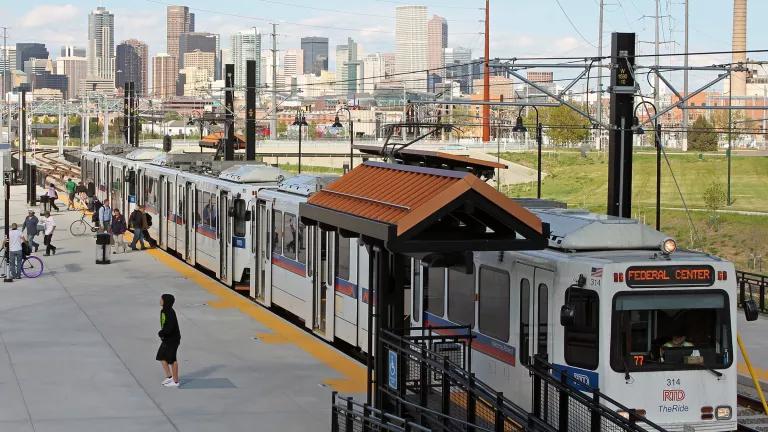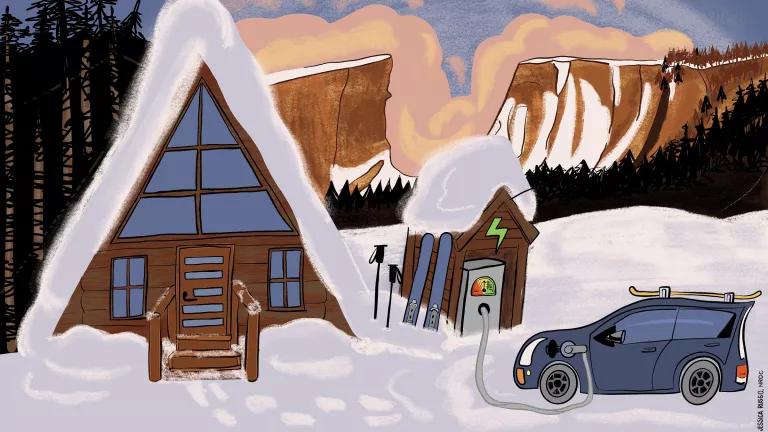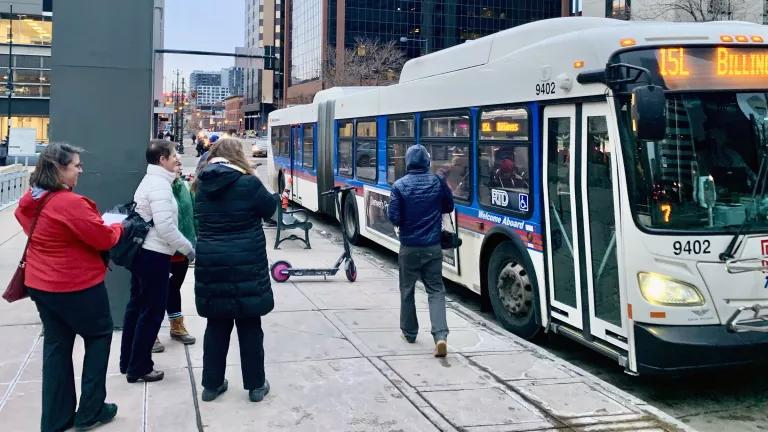Colorado Legislative Roundup: 2024
This legislative session, Colorado once again solidified its place as a climate leader by taking on new and innovative approaches to reduce emissions and protect the environment.

Colorado legislators doubled down on a commitment to sustainable growth and public transit this legislative session.
The 2024 Colorado legislative session was an active one, including a resurgence of the “oil and gas wars” and a subsequent truce, unprecedented momentum on sustainable housing development, the establishment of dedicated funding for transit via fees on polluting industries, state action to reduce ozone pollution, and a defense against federal attacks on clean water. There was also progress made on building electrification and renewable energy siting, setting the state up for more comprehensive standards in the future.
Ultimately, environmental advocates and state leaders were able to secure tremendous wins that will benefit all Coloradans by improving affordability and quality of life, cleaning up our air, fighting climate change, and protecting waterways.
The following bills* were NRDC’s top priorities at the capitol this year, supported by numerous partners as well as NRDC staff, including Max Baumhefner, Alejandra Mejia Cunningham, Cullen Howe, and Jon Devine. Governor Jared Polis has signed all of the bills and championed many of them as key components of climate action in the state.
Building sustainable communities
House Bill (HB) 24-1304 Minimum Parking Requirements seeks to rightsize parking in new developments as a strategy to increase opportunities to build new housing, lower the cost of housing construction, and reduce car dependency and sprawl. The bill eliminates minimum parking mandates in new residential buildings that are close to frequent transit, allowing builders to construct the parking necessary to meet the needs of future residents. Through the bill, the state will also develop best practices and resources to optimize parking supply. HB1304 was supported by a broad coalition, including environmental groups, housing advocates, and builders of affordable housing.
HB24-1313 Housing in Transit-Oriented Communities encourages the development of more housing near transit and commercial centers, which will allow more people to live closer to public transportation options, increase housing supply, and facilitate higher transit ridership, taking cars off the road. The bill requires urban communities with frequent transit to set housing density targets, along with affordability and displacement mitigation strategies. The bill also establishes a grant program to help local governments upgrade infrastructure to facilitate increased density near transit.
Senate Bill (SB) 24-174 Sustainable Affordable Housing Assistance requires the development of statewide and local housing needs assessments, along with housing action plans. The bill also requires the inclusion of strategic growth strategies within master plans to discourage sprawl and promote development in underutilized land near existing infrastructure.
The collective power of these proposed land use strategies was previously covered in this blog.
Funding transit with fees on polluting industries
SB24-230 Oil & Gas Production Fees establishes a new fee on oil and gas production, directing funds to increase transit service, thus linking a key source of climate pollution with a key solution. The fee is anticipated to result in more than $100 million a year in funding for transit service across the state, with a majority being directed to RTD in the Denver region. Increasing transit service to make public transportation more frequent and convenient will help increase transit ridership, taking cars off the road and reducing air and climate pollution.
SB24-184 Support Surface Transportation Infrastructure Development sets a new fee on rental cars to fund construction of long-distance passenger rail throughout the state. The funding in the bill hopefully positions Colorado to receive federal funding awards for rail expansion. The bill also aligns existing state transportation funding sources with the state’s greenhouse gas reduction requirements for transportation, ensuring that large investments help reduce emissions and support multimodal infrastructure.
SB24-032 Methods to Increase the Use of Transit makes permanent a set of grant programs that allow transit agencies to offer free transit during ozone season and provide free transit for youth year-round. It allocates $7 million annually for ozone season transit and $7 million annually for free fares for youth. The bill also establishes a committee to develop a proposal for a statewide transit pass that can work across transit agencies in the state.
Supporting electric buildings and transportation
SB24-218 Modernize Energy Distribution Systems ensures Colorado’s largest utility, Xcel Energy, meets growing customer demand for electric cars, trucks, homes, and appliances. The bill aligns Xcel investments in its electrical distribution system with state goals to expand the use of electric vehicles, beneficial electrification, and distributed solar. The bill also establishes a grant program for worker apprenticeships and requires utilities to staff up to meet customer needs. These strategic investments will help reduce the cost of electricity for everyone because the electrification of new vehicles and buildings brings in new revenue in excess of associated costs, and because building to accommodate future demand is cheaper than making multiple, piecemeal upgrades.
SB24-214 Implement State Climate Goals (formerly HB24-1352 Affordable Appliances for a Healthy Community) paves the way for more efficient heating and cooling options in buildings. Extreme temperatures are here to stay, and everyone in Colorado deserves access to energy-efficient technologies that cool and heat our homes. House Bill 1352 would have made heat pumps, which can provide both cooling and heating in a single appliance, the standard equipment sold in the state by 2027 and would have ensured financial support was available to make that equipment affordable and accessible to all Coloradans. After lengthy discussions between environmental advocates, legislators, and the Polis administration, the final law (via SB214) directs the Colorado Energy Office to study any remaining barriers to adoption of heat pump technology across the state and to make recommendations to the legislature for how best to support a new standard. We look forward to partnering with the Energy Office on a standard bill next session that ensures all Coloradans have access to efficient heat pump technology.
SB24-212 Local Govs Renewable Energy Projects begins a conversation on the siting of new renewable energy projects that are needed to meet Colorado’s climate goals while considering wildlife protection, open space preservation, and community support. Although conversations had originally contemplated establishing state standards, the bill that was ultimately introduced was much smaller in scope and directs state agencies to provide technical support, if requested, regarding best practices to minimize wildlife impacts. The bill also requires the state to review existing local processes for the siting of renewable energy and transmission, develops a list of high-priority habitats to inform renewable energy siting plans, and requires the compilation of codes and ordinances to support renewable energy project development. The bill also clarifies the need for local governments to consult with tribal governments before approving projects.
Protecting clean air and water
SB24-229 Ozone Mitigation Measures resulted from months of advocacy and negotiation for the state to address air pollution. Colorado’s front range is in severe non-attainment of federal ozone laws, with communities of color bearing the worst of the health effects. SB229 establishes more modeling of air pollution impacts in disproportionately impacted communities and strengthens air violation enforcement mechanisms and public communication. The bill codifies nitrogen oxide reduction targets from oil and gas production and sets up a new rulemaking for emissions controls on oil and gas.
HB24-1379 Regulate Dredge & Fill Activities in State Waters adopts state-level protections for wetlands and streams to fill the gap created when the U.S. Supreme Court rolled back more than 50 years of federal Clean Water Act protections for waterbodies in its Sackett v. EPA case last year. The bill protects all Colorado waters and ensures that permits for filling them are at least as stringent as the Clean Water Act standards that had applied before the Supreme Court’s decision. It also focuses on ensuring that projects avoid, minimize, and mitigate harm that they would cause to wetlands and streams.
-----
This legislative session, Colorado once again solidified its place as a climate leader by taking on new and innovative approaches to reduce emissions and protect the environment.
Of course, as we move toward deeper levels of decarbonization, more work will be needed. Colorado will continue to grapple with how to reach 100 percent renewable electricity production by 2040 and how to build out enough renewable energy to reach that goal in ways that protect wildlife and support communities. The state will also continue to reckon with the role of fossil gas in our buildings and homes and will need to pursue avenues for beneficial electrification. Legislative wins from the 2024 legislative session should put wind in our sails to continue pursuing ambitious policy.
*HB stands for House Bill, a piece of legislation that originated in the House of Representatives. SB stands for Senate Bill, legislation that originated in the state Senate. All of the bills include the number “24” to indicate 2024 and are followed by a unique number used to name the legislation.



